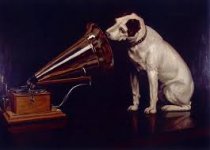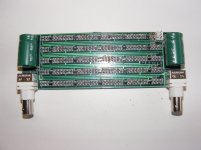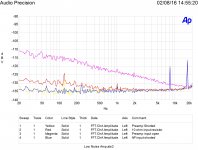The timbre has to be right.
When the Timbre is off, the reproduced voice is immediately identified as being reproduced.
When the timbre and dynamics are right, one can be fooled into thinking the person is in the room.
Ever been fooled?
The usual reason given for the question of why the human voice is considered to be more difficult to reproduce convincingly is that the voice of a person that is known to you is more familiar.
Your reference memory for the sound being evaluated is therefore more detailed and a better tool for comparison.
Given that the kind of memory involved is known to be less detailed than the kind of memory that can be accessed using quick comparisons, it is probably not the most demanding test.
What a crock. The voice that you know over decades has to be the ultimate test.....Given that the kind of memory involved is known to be less detailed than the kind of memory that can be accessed using quick comparisons, it is probably not the most demanding test.
Dan.
What a crock.
Science can be a bi#ch, but it is not a crock.
The voice that you know over decades has to be the ultimate test.
True in general, but until you've done proper tests, its hard to realize what a skilled listener can do with new program materoial and quick switching under his control.
There's a probable important difference between our posts in this matter, Dan. My posts are about experiences that involved quick switched DBTs and yours were most likely slow switched and sighted.
I understand that audio mystics hate quick switching. My experience is that it heightens the difference between "sounds the same" and "sounds different". If you want to believe that everything matters, this is poison.
BTW I can duplicate anything you've claimed lately with a sighted evaluation and so can just about anybody else who tries. Just about anything that anybody can think up valid or not, can be supported with that kind of evidence.
Nope, my switching is close to instant.There's a probable important difference between our posts in this matter, Dan. My posts are about experiences that involved quick switched DBTs and yours were most likely slow switched and sighted.
Sure, bigtime.......quick switching. My experience is that it heightens the difference between "sounds the same" and "sounds different".
BS. Several subjects independently expressing the same findings. Sighted testing is not a confounder in this circumstance.BTW I can duplicate anything you've claimed lately with a sighted evaluation and so can just about anybody else who tries. Just about anything that anybody can think up valid or not, can be supported with that kind of evidence.
Dan.
What a crock. The voice that you know over decades has to be the ultimate test.
Dan.
Whose voice though... you cant use your own.
Nope, my switching is close to instant.
That's more than vague. How about some numbers?
When you deal with radical subjectivists, you have to learn how to step around such things, I guess.
Several subjects independently expressing the same findings.
Science says absolutely not. Consistency of findings is easy to explain if there is communication between the test subjects. It can lead to anomalous outcomes such as having more errors then correct answers, when results would be expected to converge to random guessing.
Sighted testing is not a confounder in this circumstance.
if wishes were fishes...
Sure, anybody's voice, agreed not your own.Whose voice though... you cant use your own.
Dan.
Many people believing the same thing says absolutely nothing. Easy to proof, by example:
There must be a 100 million or more people that believe the moon landings actually took place;
There must be a 100 million or more that believe that the moon landings were fabricated by a temporary NASA/Hollywood combine;
These two views are mutually exclusive;
Therefor, there exists 100 million or more people that all believe the same thing and that are all wrong.
Isn't logic neat?
There must be a 100 million or more people that believe the moon landings actually took place;
There must be a 100 million or more that believe that the moon landings were fabricated by a temporary NASA/Hollywood combine;
These two views are mutually exclusive;
Therefor, there exists 100 million or more people that all believe the same thing and that are all wrong.
Isn't logic neat?
Many people believing the same thing says absolutely nothing. Easy to proof, by example:
There must be a 100 million or more people that believe the moon landings actually took place;
There must be a 100 million or more that believe that the moon landings were fabricated by a temporary NASA/Hollywood combine;
These two views are mutually exclusive;
Therefor, there exists 100 million or more people that all believe the same thing and that are all wrong.
Isn't logic neat?
It's also valid and instructive. Science is not determined by public opinion surveys.
BTW, after studying the history of science, I've discovered evidence that:
Most scientists believed that kinetic energy was proportional to velocity (not proportional to the square of velocity), as late as the Civil War or perhaps even later.
People who believed otherwise were often persecuted and ostracized from meetings of establishment scientists. It is possible that Newton himself believed this.
Sure, anybody's voice, agreed not your own.
Dan.
Have a look at modified rhyme testing, you may find some stuff of interest.
I would have to say from just personal experience that the majority of the time if you are paying attention, no matter how well it is done you know that you are listening to a recorded voice and not someone actually saying something. I don't believe that even in a live event at low volumes, not amplified out of a natural spl level, that we don't know we are listening to reproduced voice. So that being the case I think the best that can happen is that you can be fooled into believing for a second that someone is talking to you or just talking enough to attract your attention, to turn and look and realize that the voice is recorded. After that initial moment the illusion falls apart. There is just enough skewing of the human voice once put into the chain from mic to speaker that we always know it is not an actual voice coming from a human mouth.
<snip>
Given that the kind of memory involved is known to be less detailed than the kind of memory that can be accessed using quick comparisons, it is probably not the most demanding test.
Could you please cite some experimental studies that examined the question which kind of memory is less detailed (wrt complex stimuli)?
Evaluation of sound reproduction quality - given complex stimuli are used - is a multidimensional process.
Could you please cite some experimental studies that examined the question which kind of memory is less detailed (wrt complex stimuli)?
Not without more work than I have time to do right now.
I'd first check the bibliography of This Is Your Brain On Music.
Evaluation of sound reproduction quality - given complex stimuli are used - is a multidimensional process.
Agreed, but so what? Isn't that well known among people doing this sort of thing?
hi marce/others,For slow clocks with a sane rise & fall time it isn’t that much of an issue, as boards of 74/4000 logic with widely distributed clocks testifies too.
When you do get problems though with a clock it can be a nightmare to solve especially if you don’t have Signal Integrity software to both model the signal scenario or to run simulation on layout schemes to check their validity. If you have a clock that has to feed multiple devices such as JTAG the solution depends on numerous factors,
been too sick to respond til now, sorry for that. thought I should respond so that you do not think your response had fallen on deaf ears. I'll keep this short as I can, i am running a fever. funny you mention 7400/4000 series logic and my mind is in eclips. some of these analog guys may have to look up eclips logic, it is mature but specialized technology.
jtag to me is a slow clocking system, but a valid one, as any other. jtag master clocks or scan clocks never go over 10MHz that I know of.
clock distribution networks is way off topic for this thread and audio forum.
Have you ever used hyperlynx SI? or any of the other SI tools (parasitic extraction of your pcb)? if not, i suggest that you get a hyperlynx demo going and try it out, it is really nice tool to use. I have not visited Cadence or Mentor ecad sites to get up to speed on all that is available today, but the basics remain the same. I used these tools now going on 20 years ago. it was sort of bleeding edge back then but i would think that it is or should be more the norm these days, that is if you are doing high speed designs, with tight timing margins(ps). without these tools you are at a huge dis-advantage as you say. We liked/tried our best to do "correct by design" pcb designs, similar to ASIC/IC design, full timing/SI simulation up front to try to minimize the surprises,costs,delays.
When I was doing pcb design for fibre channel networks, we routinely had 53MHz system clock, 36 bit data paths, yes 32 bit with 4 parity, for the parallel stuff that eventually got made into a serial stream, using a serdes in the 2-10Gb/s range. i know they are in the 20/40G range now.
the last big pcb design i did was 16 layers, all controlled Z, thin stackups for embedded capacitance to distribute low noise power supplies, nelco dielectric (gee I even remember the name of the stuff, i checked it is still around), it was a marvell in its day. So we had to do SI on all these pcb designs or we'd be dead in the water without sim.
so that is my bit of experience and history, just thought I'd get this out there for you or anyone else interested in high speed logic design. no need to respond and bore the slow edge rate analog guys with ps logic discussions, more important crap for you guys to discuss than how to design a pcb
Rick
I have found that it is easier to reproduce a guitar to a very high standard, even to the point of thinking that it is 'live', than to catch the emotional heart of a good female voice apparently singing to you.
I remember a successful guitar A-B demo being done by Acoustic Research in 1965. However, I have found that when many hi end designers evaluate audio quality, we use human female voice, and its nuances, as the final 'emotional' arbitrator of a quality hi fi system.
I remember a successful guitar A-B demo being done by Acoustic Research in 1965. However, I have found that when many hi end designers evaluate audio quality, we use human female voice, and its nuances, as the final 'emotional' arbitrator of a quality hi fi system.
The voice that you know over decades has to be the ultimate test.
Dan.
I also find this most revealing. If you record to a very high standard the voice of your wife, daughter or other female who you are intimately familiar..... how close the reproduction 'system' is to that 'real' voice will be most revealing.
THx-RNMarsh
Well I finished my first low noise preamp. Turns out I should add a DC servo to it. Did need the line terminators.
Attached is a picture and the noise measurements on my AP. Zero dB is .001 V input to the preamp. (-120 = 1 nano volt!) For really low noise measurements will need a second stage!
Attached is a picture and the noise measurements on my AP. Zero dB is .001 V input to the preamp. (-120 = 1 nano volt!) For really low noise measurements will need a second stage!
Attachments
Last edited:
- Status
- Not open for further replies.
- Home
- Member Areas
- The Lounge
- John Curl's Blowtorch preamplifier part II


